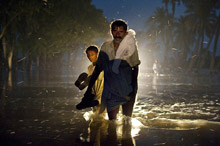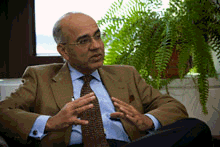
Typical street scene in Santa Ana, El Salvador. (Photo: iStock)
IMF Survey: IMF Assesses Financing for Pakistan After Devastating Floods
August 24, 2010
- Pakistani team in Washington to discuss country's economic prospects after floods
- Pakistan and IMF to look at need for emergency financing
- Reconstruction costs expected to run into billions of dollars
The International Monetary Fund is meeting with Pakistani government officials in Washington to evaluate the economic impact of devastating floods that have left millions homeless and to discuss ways in which the IMF can help in the recovery.

Flooding in Basira, Pakistan: IMF is discussing how it can help Pakistan as part of ongoing $11 billion loan program (photo: Pedro Ugarte/AFP)
ASSISTANCE FOR PAKISTAN
Masood Ahmed, Director of the IMF’s Middle East and Central Asia Department, described the flooding as a “human catastrophe that is still evolving.”
He said in an interview with IMF Survey online that the economic costs would be very significant. The IMF is discussing this week the implications for the budget and longer term growth targets and how the IMF can help Pakistan as part of an ongoing $11 billion loan program. The program began in late 2008 and loan installments are subject to a review by the IMF of Pakistan's economic policies and performance, including the government's budget deficit and making public finances more sustainable. The Fund will also discuss with Pakistani officials the need for emergency assistance.
Pakistani Finance Minister Abdul Hafeez Shaikh is due to attend talks with the IMF on August 26.
Following is a transcript of the interview.
IMF Survey online: What’s the economic impact of the floods on Pakistan?
Masood Ahmed: The floods are having a major impact on the economy of Pakistan. They are, of course, a human catastrophe and it’s still evolving, but the economic impact is also going to be very significant. It’s affecting the agricultural sector. Production is going to be down, which will affect the government’s budgets because they will have to spend more and they’ll be able to raise less revenue.
And then Pakistan will have massive reconstruction costs down the road running into the billions of dollars. So the economic effects will be large and they will last a long time.
IMF Survey online: What can the IMF do to help Pakistan?
Ahmed: The IMF has been helping Pakistan over the past two years with the global financial crisis. Now the people of Pakistan, the economy of Pakistan are going to go through a more difficult period and the IMF stands with them to help.

Masood Ahmed: “Pakistan will have
massive reconstruction costs down the road
running into the billions of dollars.
So the economic effects will be large”
(IMF photo)
And we can help them in the first instance by looking at the impact and then looking at how we can be part of the international solution to providing some support during this difficult period.
IMF Survey online: What do you think will be the impact of Pakistan’s current program with the IMF?
Ahmed: We have a program with Pakistan and a team from Pakistan is coming here this week. And the focus of those discussions is precisely going to be on how the economy is going to be affected by the floods. It’s a little bit early, but not too early to begin to make an impact on that. And then to see how the parameters of the existing program will need to be changed.
It is clear that the effect of the floods on the fiscal side will mean that the budget targets that were included in the program, the growth projections that were included in the program, will all need to be revisited together. And that’s what we’re going to be doing.
IMF Survey online: Do you expect to provide emergency financing?
Ahmed: We’ll be looking at how we, the IMF, can provide financial support during this difficult period. We already have a program in place and we also have the possibility of providing financing through an emergency instrument for natural disasters, and we’ll be discussing both of those with the visiting delegation.


